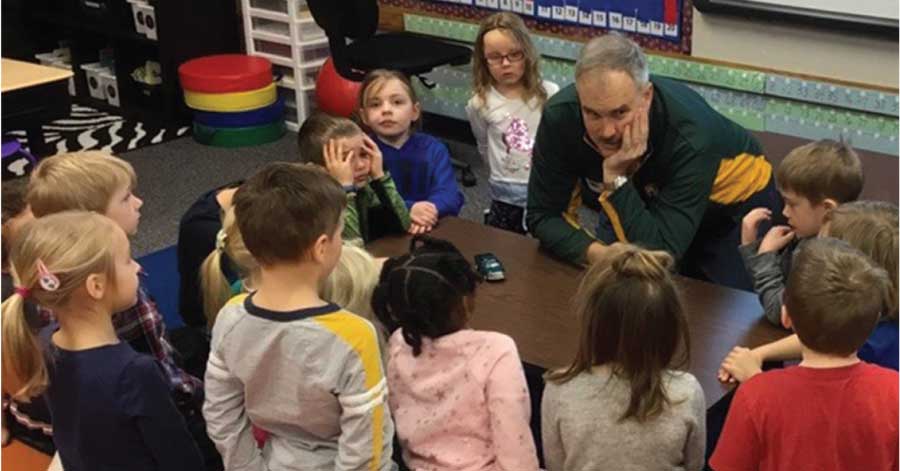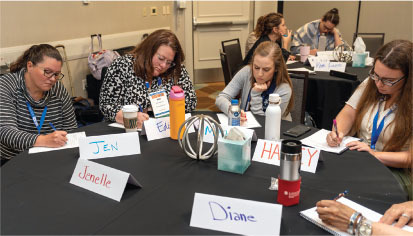September/October 2019
Leading Insight
The Ethics of Cheerleading
BY BRAD SCHMIDT, P.E., RETIRED
Long ago in North Dakota, members of our state society were discussing a proposed continuing education requirement for professional licensure. As with any good debate, there were passionate positions on either side, some questioning, in essence, the need for licensed engineers to spend time in the “classroom.”
Today’s continuing education requirements for professional licensure are quite common, a simple fact of the profession. The required types of CEUs, however, have evolved, with many states requiring an engineering ethics part in the “curriculum.”
We’ve all been in one or more of those ethics presentations, trying to be attentive on a subject that’s difficult at best to keep interesting. Speaking from personal experience, if you think listening requires effort, try presenting the topic; it’s humbling by most any measure.
When recently asked to do so, I chose to tackle the subject from a different perspective: the ethics of promoting our profession. My hope was to spur the audience to think about stepping back from today’s demanding workplace and consider what carried us to the career successes so many engineers are enjoying. (See article about the NSPE Code of Ethics provision that encourages engineers to provide career guidance to youth.)
Throughout college and my career, I always found myself blessed to have peer engineers a mere phone call away for most any reason. I was always so appreciative that an engineer would take time out of their busy workday to visit about ideas, problems, or issues I’d call them about, or better yet, take time to visit in person. I recall the intrigue of listening in college to an engineer talk of their work and projects, and wondering what it would be like if I ever made it that far. Throughout my career, the networking opportunities through my involvement in professional societies were equally rewarding.
But encouragement from those engineers was also a factor—those congratulatory comments after a paper presentation, or an encouraging word about the challenges they knew I was facing as an engineer. Without doubt, those times shaped me as an engineer. They influenced me to a point where, as a retired engineer, I try to do the same for those students, collegians, and young engineers following my path in their profession quest; I feel the need to give back.
During my career years, I was always proud to see businesses, industries, and consulting firms supporting their employees through conference attendance, local event participation, and society memberships. My own employer was fantastic in that regard, and in fact, expected employees to take advantage of these opportunities; it was part of our performance evaluations. One could almost liken it to a continuing education requirement.
Lately it seems that professional membership is slipping somewhat. That interest to step away from the grindstone and smell the roses, so to speak, by promoting the profession, sometimes seems like it might be waning. If I’m correct, and I hope I’m not, it’s most unfortunate and would be a missed opportunity for the profession.
Being a good engineer today is challenging, not that it’s never been so before. However, as society and technology changes, new ethics challenges arise, and the lines start to blur. For students and young engineers, those changes can be not only daunting, but also intimidating enough to question engineering as a career choice. That’s why within our profession, taking that time to get reinvolved needs to become a higher priority for all engineers.
When you consider the young engineer down the hall, or the college student cramming for an exam, or even the elementary kid daydreaming about what they want to be, take time to catch your breath and spend some of it sharing your experiences and what drew you into this profession we so love. Invest a little of your time back into the next generations that are going to take our places someday. Make time to attend that next society meeting with a young peer; call your old college and ask how you might help out sometime; or get involved with a local STEM group in the schools.
I doubt you’ll ever regret doing so, and in fact I might suggest you’ll find it not only quite refreshing, but also very rewarding. It’s giving back in appreciation for times when someone took time to care enough about you. It’s the ethics of cheerleading our profession!
NSPE member Brad Schmidt, P.E., Retired, worked for almost 40 years at Cass County Electric Cooperative in southeastern North Dakota. He served as vice president of engineering and operations.
 THE AUTHOR ENJOYS SPENDING TIME WITH A KINDERGARTEN CLASS SOLVING A PROBLEM: BUILDING A ROBOT TO CAPTURE A MOUSE IN THE CLASSROOM.
THE AUTHOR ENJOYS SPENDING TIME WITH A KINDERGARTEN CLASS SOLVING A PROBLEM: BUILDING A ROBOT TO CAPTURE A MOUSE IN THE CLASSROOM.


 Volunteering at NSPE is a great opportunity to grow your professional network and connect with other leaders in the field.
Volunteering at NSPE is a great opportunity to grow your professional network and connect with other leaders in the field. The National Society of Professional Engineers (NSPE) encourages you to explore the resources to cast your vote on election day:
The National Society of Professional Engineers (NSPE) encourages you to explore the resources to cast your vote on election day:




